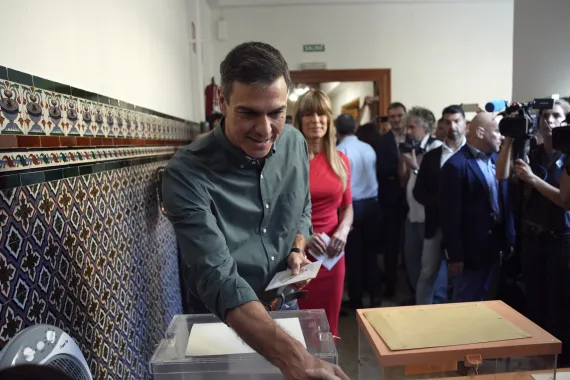Spanish voters went to the polls on Sunday to determine whether to give Socialist Prime Minister Pedro Sanchez another four-year term in office or, as the polls predict, to restore the right to power alongside its far-right allies.
Left-wing parties in Europe would suffer a severe setback if the fourth-largest economy in the eurozone were to turn to the right, replicating a similar shift that occurred in Italy last year.
Most surveys and analysts predict that Alberto Nunez Feijoo’s conservative Popular Party (PP) will win the election, although unexpected results may be in store.
Around one in five voters were still uncertain as of Monday’s most recent polls, and it is still unknown how the election’s scheduling — held during the height of the summer holidays in the sweltering heat of late July — will affect turnout.
More than 2.47 million of the 37.5 million registered voters in Spain have cast absentee ballots, a record figure, according to the Spanish postal service on Saturday. This is due to the fact that many Spaniards are on vacation.
The polls started at 9:00 am (0700 GMT) and will conclude at 8:00 pm, with the results anticipated within a few hours.
After casting his vote in Madrid, Sanchez urged for a “record turnout” to create a “strong government.”
He went on to say that the election is “essential not just for us, but for the globe and for Europe.”
The PP leader’s final week of campaigning has not gone well. He fumbled over the pensions issue and faced a revival of unsettling inquiries about his relationships with a now-convicted drug dealer in the 1990s.
It would be a great surprise if the PP did not win, though. But whether it will be able to create a government is a another story, according to political scientist Pedro Riera Sagrera of Madrid’s Carlos III University.
Feijoo hopes his party will gain the necessary 176 seats in the 350-seat parliament to be able to rule alone, but the polls indicate otherwise.
They indicate that he will probably fall short and will need to work out a compromise with the extreme right Vox, which was created in 2013 as a result of a PP split.
Feijoo, who describes himself as a moderate but whose party recently forged agreements to jointly govern with Vox in local and regional authorities following the right’s victory in the regional elections in May, faces a significant challenge as a result of this.
Vox refused to budge on contentious stances like its opposition to abortion or trans rights, its denial of gender violence, or its denial of climate change during the negotiations.
The far-right would be participating in a Spanish government for the first time since the Franco dictatorship’s overthrow in 1975, according to Santiago Abascal, the head of Vox, who has warned the PP that it will expect a seat in government in exchange for its support.

